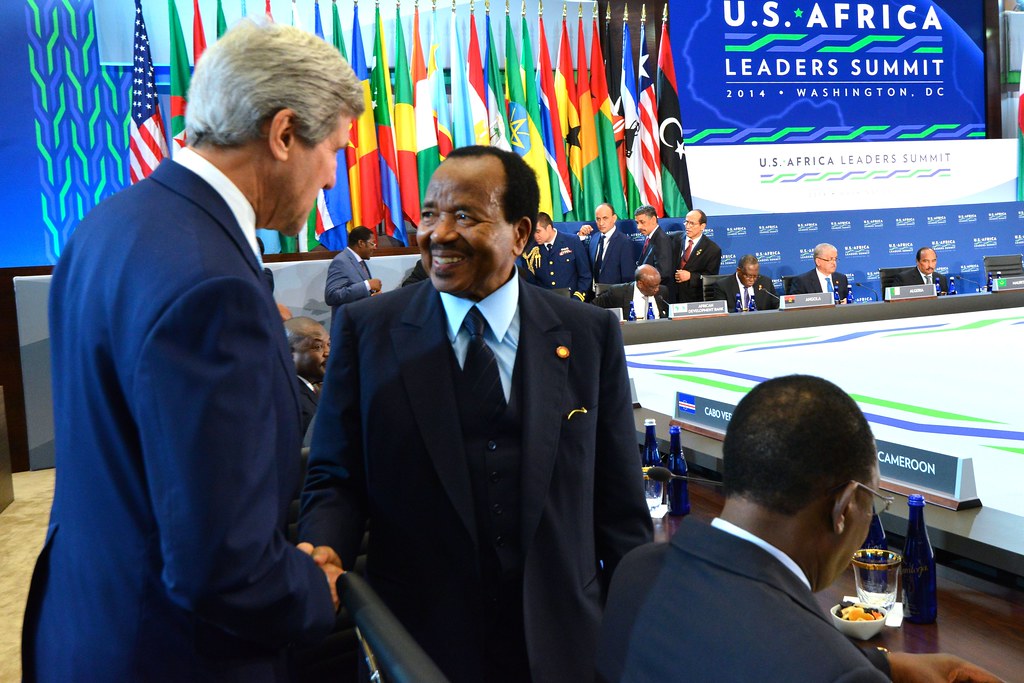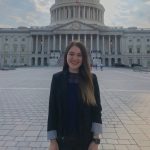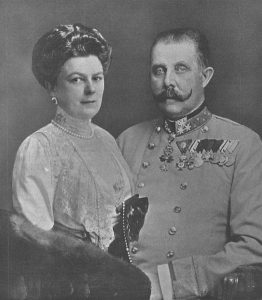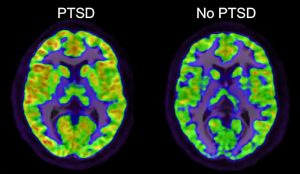The Republic of Cameroon, originally named Kamerun, is located in West Africa. The current President is Paul Biya, who is also one of only two presidents that Cameroon has had and the longest-serving leader in Africa, for over thirty years. Biya started his political career at the age of 43, as Cameroon’s Prime Minister under Ahmadou Ahidjo in 1975, becoming his successor in 1982. Because of his presidential ability, Biya modified the Cameroonian Constitution to allow presidents to serve for more than two terms and to be eligible for re-election every seven years.1 Even though Biya’s previous presidential elections ran smoothly, as 2016 arrived, Biya knew he would be faced with a formidable opponent, the Southern Cameroons National Council (SCNC).
In 1955, Kamerun gained independence from France and Great Britain. Then, in 1961, Ahmadou Ahidjo was elected President and renamed the country to the Federal Republic of Cameroon. Five years later, Ahidjo banned all political parties to avoid the lobbying of ethnic groups that were seen as a threat to national unity, including English-speaking communities.2 Nonetheless, in 1972, Cameroon created a new constitution that declared French as the language of the Eastern state and English as the language of the Western state, although English actually dominated Cameroonian commerce, technology, education, and politics.3 Yet, French officials saw this constitutional provision as a threat, and used French as the administration’s language of preference.4
After twenty-two years of ruling Cameroon, Ahidjo was pressured to resign by the French socialist government.5 His successor was his former prime minister, Paul Biya.6 Biya continued under Ahidjo’s party, Cameroonian National Union (CNU). Shortly after, former president Ahidjo regretted his decision in assigning Biya as his successor and attempted to overthrow him through a coup.7 For this reason, Ahidjo fled into exile in 1983 for attempting to conspire against the government. Absent from his trial, he was found guilty and sentenced to death.8 Biya then renamed Cameroon to the Republic of Cameroon and created the Cameroonians People’s Democratic Movement (CPDM) party, which later won the majority of the seats in parliament, thereby turning Cameroon into the most corrupt country in the world, according to Transparency International.
In December 1990, President Biya legalized the creation of a multiparty system to prove his party’s legitimacy. This introduced the union of parties with a connection to specific ethnic groups or provinces.9 When the first elections were held, Biya’s party won less than fifty percent of the seats, whereas the new parties won over sixty-eight percent of the seats. Biya knew he would have a problem if he did not join forces with the newly elected ruling party, so he did.10
With the establishment of a multiparty system, the anglophone regions organized a meeting in 1993 to promote a return to federalism, known as the All Anglophone Conference (AAC). However, the proposal was rejected twice by the Consultative Committee for Review of the Constitution. This did not stop the anglophone community as they created a council to encourage the two-state federation known as the Southern Cameroons National Council (SCNC). The SNCS members continued to hold protests in the anglophone provinces every October 1, advocating for their independence, calling it the Republic of Ambazonia.11

As an attempt to fix this problem, Biya modified the constitution in 2008, in agreement to establish English and French as the official languages, so they could both share equal status.12 However, in 2016 the French-speaking government imposed the use of French language in schools and courts in anglophone parts of Cameroon.13 In opposition to this, English-speaking teachers and lawyers protested against the employment of French-speaking educators and officials, who did not speak English and had no prior knowledge over the judicial courts. This alteration became known as the “anglophone crisis.”14 Anglophones argued that their minority rights were being violated and felt their judicial, educational, and local government systems should be protected. Both, anglophone lawyers and teachers formed the Cameroon Anglophone Civil Society Consortium (CASCSC). Meanwhile, Biya and his French-administered government were calling the anglophone activists “separatists.”15

In October 2017, the anglophone separatist leader, Julius Tabe, declared the independence of the Republic of Ambazonia. With elections less than a year away, Biya knew he had to do something about this. He was not going to let any “separatist” seize the country he has been leading for thirty-five years. Biya responded to this act by shutting down the internet for three months, banning the CACSC and SCNC, and incarcerating several leaders of these movements.16 This instigated violent protests in major cities in Northwest and Southwest Cameroon, leaving many dead and injured.17 The violence caused over 30,000 Cameroonians to flee their homes into the neighboring country, Nigeria.18 During 2017, several businesses, government buildings, automobiles, and schools had been set on fire in the anglophone regions by, both, the anglophones and francophones. As a result, schools were shut down for over a year, leaving hundreds of children without an education. Additionally, because of the protests by the anglophone community, Biya made several policies, such as the banning of any crowds with more than four people, imposing curfews, and deploying military forces into anglophone regions of Cameroon seeking to kill any “separatists” that may be a threat to the country.19

Biya was not going to let an opposing party diminish his chances of reelection, much less would he let them destroy the country he had built for over thirty years. According to an International Crisis Group, one of Cameroon’s Supreme Court justices was arrested for funding an anglophone campaign in 2017, and since then has been imprisoned. Because of these occurrences and the violence between both groups, anglophone communities were left in fear and without shelter, food, water, or healthcare. Throughout this time, Biya denied the existence of an “anglophone crisis.” Instead, the ruling party, Cameroon People’s Democratic Movement (CPDM), organized the first celebration of Cameroon’s reunification in support of the Republic of Cameroon and President Biya.20
Biya frightened thousands of individuals that only half of the country’s eligible voters partook in the presidential election and in October 2018, Paul Biya won his seventh presidential term. The opposition party called for a re-run of the presidential election in 2018 but was denied by the Constitutional Council, leaving the inhabitants of Cameroon in desperation for reform and an end to the language division. Today, President Biya has shown no signs of a compromise; instead, he continues to send military troops to kill or arrest those who appear a threat to the Republic of Cameroon.
International organizations, including the United Nations, European Union, and African Union have urged the anglophone and francophone parties to abstain from violence. and to preferably engage in a dialogue to reach an agreement that compliments both parties. However, Biya claims it has attempted numerous methods to deal with the anglophone community.21 Up to the present moment, Biya does not have a successor to follow his presidency, leaving critics to believe that the only way for Cameroon to prosper is to have a change of president. For now, Biya does not plan on letting anyone get in his way.
- Constitute, “Cameroon’s Constitution of 1972 with Amendments through 2008 PDF file,” Constitute Project, August 12, 2019, https://www.constituteproject.org/constitution/Cameroon_2008.pdf?lang=en. ↵
- “Cameroon’s Worsening Anglophone Crisis Calls for Strong Measures,” International Crisis Group, July 12, 2018, https://www.crisisgroup.org/africa/central-africa/cameroon/130-cameroon-worsening-anglophone-crisis-calls-strong-measures. ↵
- Carlous Muluh Nkwetisama, “Rethinking and reconfiguring English language education: Averting linguistic genocide in Cameroon,” International Journal of Applied Linguistics and English Literature 6, no. 6 (2017): 106. ↵
- Bernard Fonlon, “The language problem in Cameroon. (An historical perspective),” Comparative Education 5, no. 1 (1969): 38. ↵
- Tangie Nsoh Fonchingong, “Multipartyism and democratization in Cameroon,” Journal of Third World Studies 15, no. 2 (1998): 122. ↵
- BBC, “Cameroon profile – Timeline,” BBC News, October 22, 2018, https://www.bbc.com/news/world-africa-13148483. ↵
- Paul Lewis, “Cameroon Radio Says An Attempted Coup Has Failed,” The New York Times, April 7, 1984, https://www.nytimes.com/1984/04/07/world/cameroon-radio-says-an-attempted-coup-has-failed.html. ↵
- Glenn Fowler, “Ahmadou Ahidjo of Cameroon Dies; Ex-Leader was 65,” The New York Times, December 2, 1989, https://www.nytimes.com/1989/12/02/obituaries/ahmadou-ahidjo-of-cameroon-dies-ex-leader-was-65.html. ↵
- Tangie Nsoh Fonchingong, “Multipartyism and democratization in Cameroon,” Journal of Third World Studies 15, no. 2 (1998): 120. ↵
- The Commonwealth, “Cameroon: Constitution and politics,” Accessed 2020, https://thecommonwealth.org/our-member-countries/cameroon/constitution-politics. ↵
- “Cameroon’s Worsening Anglophone Crisis Calls for Strong Measures,” International Crisis Group, July 12, 2018, https://www.crisisgroup.org/africa/central-africa/cameroon/130-cameroon-worsening-anglophone-crisis-calls-strong-measures. ↵
- The Commonwealth, “Cameroon: Constitution and politics,” Accessed 2020, https://thecommonwealth.org/our-member-countries/cameroon/constitution-politics. ↵
- Siobhan O’Grady, “Divided by Language,” The Washington Post, February 5, 2019, https://www.washingtonpost.com/graphics/2019/world/cameroon-anglophone-crisis/. ↵
- BBC, “Cameroon profile – Timeline,” BBC News, October 22, 2018, https://www.bbc.com/news/world-africa-13148483. ↵
- Siobhan O’Grady, “Divided by Language,” The Washington Post, February 5, 2019, https://www.washingtonpost.com/graphics/2019/world/cameroon-anglophone-crisis/. ↵
- Nna-Emerka Okereke, “Analysing Cameroon’s Anglophone Crisis,” Counter Terrorist Trends and Analyses 10, no. 3 (2018): 9. ↵
- “Cameroon’s Worsening Anglophone Crisis Calls for Strong Measures,” International Crisis Group, July 12, 2018, https://www.crisisgroup.org/africa/central-africa/cameroon/130-cameroon-worsening-anglophone-crisis-calls-strong-measures. ↵
- Siobhan O’Grady, “Divided by Language,” The Washington Post, February 5, 2019, https://www.washingtonpost.com/graphics/2019/world/cameroon-anglophone-crisis/. ↵
- “Cameroon’s Worsening Anglophone Crisis Calls for Strong Measures,” International Crisis Group, July 12, 2018, https://www.crisisgroup.org/africa/central-africa/cameroon/130-cameroon-worsening-anglophone-crisis-calls-strong-measures. ↵
- “Cameroon’s Worsening Anglophone Crisis Calls for Strong Measures,” International Crisis Group, July 12, 2018, https://www.crisisgroup.org/africa/central-africa/cameroon/130-cameroon-worsening-anglophone-crisis-calls-strong-measures. ↵
- “Cameroon’s Worsening Anglophone Crisis Calls for Strong Measures,” International Crisis Group, July 12, 2018, https://www.crisisgroup.org/africa/central-africa/cameroon/130-cameroon-worsening-anglophone-crisis-calls-strong-measures. ↵




52 comments
Mia Gonzales
Hi Lesly!
Thanks to you and your research for this article, you have brought important political news to light that may have been overlooked solely for the fact that it occurred in Africa. This article is important in understanding the political climate of young African nations and is an important read to political analysts and political historians everywhere. As an American without an official language, it is very interesting to see how one language versus another becoming the official language can turn out politically.
Yamilet Muñoz
I’m fascinated to read about how big the language difference has taken a toll in this country. I have always understood language differences to be a big factor in social change within communities, but your research shows much more than that with citizens fleeing and the imposed political and military force to prevent violence. This is certainly something new for me to read about when it comes to linguistic differences.
Samantha Ruvalcaba
Great job on walking us through this timeline of events, it really showed Biya’s increased fixation on keeping his power. Thank you for mentioning what the effects of Biya’s actions had on the citizens of Cameroon. It’s unfortunate that the children and their communities are the ones dealing with the consequences of their leader’s actions.
Cirilio Vivenza
Although Cameroon’s language-turned political divide is relatively new, its recent crisis now presents a condition that is at a loss to repair, especially under its constitutional president. These are one of those situations where no matter what action the government takes, only anger and sometimes violence comes from it, and it doesn’t make it any better that the president will do everything in his power to prevent his country from being territorially fractured. I wonder in what ways President Paul Biya equalizes both the anglo and francophone statuses.
Phoebe Dickinson Land
Fantastic and thought-provoking article. I think we have a bad habit of ignoring news that doesn’t affect us directly and had I not read this article I am not sure I would ever have been aware of the situation in Cameroon. It is also incredibly interesting to see the direct effect that language is playing in this divide, as it is something that seems almost harmless without the full context.
Marian Reyes
It is difficult to imagine that something like the language you speak can cause such horrible tragedy, but this article does an excellent job of explaining the decades of events and ideas that lead to this crisis. Due to the actions of both colonizers and corrupt ideologies, The Republic of Cameroon appears to be perpetually stuck in a state of transition. It is impossible to work towards improving economic, political, infrastructural, or institutional systems when the nation is killing/incarcerating a significant part of its population. Not to mention how this affects the cultures of minorities and Cameroon as a whole.
Micheala Whitfield
Insane how a difference of language can be a trigger. All for who is right and who was wrong. Neither one side thought to come together. It was always about best interest. There is always a bad guy in history and it is sad to read how dark this one was. Great title to go along with your article. I can see why you correlated “The Purge” with the Presidents actions.
Valeria Varela
I was bit surprised to read how severe corruption is in this country. I always here about how corrupt developing Latin American countries are but I would’ve never imaged that The Republic of Cameroon would be one of the most corrupt in the world. They obviously have a long way to go in order to elect an official that would be for the people of Cameron not led by greed. Overall it was a great article I throughly enjoyed it.
Aaron Sandoval
I know very little about the issues facing the countries in Africa, I have always been interested in the area and this article made it easy to jump in. It was well written and did a good job covering the topic. I knew very little about Cameroon, but many of the issues seem clear with politicians seeking to maintain their control, and dividing the nation into multiple languages would make it difficult to maintain a unified nation. I look forward to learning more about the issues facing the countries in Africa.
Christopher McClinton
In the wake of this article this clearly shows how hard it is to manage a nation. It is going to be a longtime before Cameroon can get back on track. It is going to take more than the UN to assist with curving the violence and the corruption . The title “The Purge” money and greed and death and no progression. It is my hope that there will be a reform plan to help the people that are suffering in the nation.